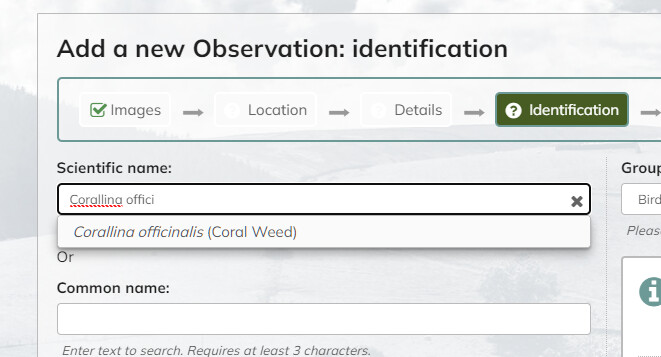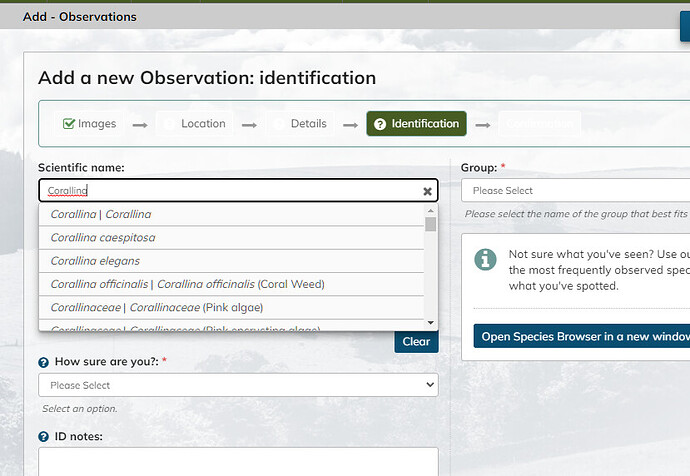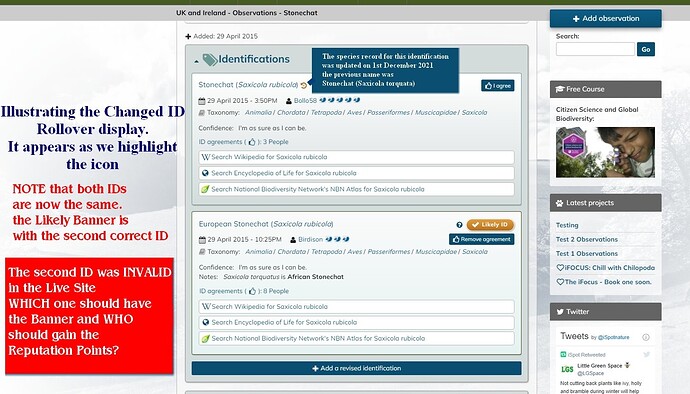My agreement invoked the Likely Banner. Sorted!
There are no common names in the drop down menu for Common Coral Weed (Corallina officialise) & Tufted Coral Weed (Corallina caespitosa)
Not sure if this sort of thing will be picked up automatically in the new dictionary. This millipede was added this morning:
and I’ve been looking through others, as one does, as I’m not certain it can be id’d to species. See this one and Chris Brooks’ comment, which I ‘tested’ and it’s still the same. The first Polydesmus is fungus, the second is invertebrate:
Absence of common names is common and of little or no consequence. CONFUSING or WRONG ones need reporting. Those common names which generate a different Sc. one to the norm should be reported.
One can manually add ANY common name to an ID after the Sc. is selected but we should be very sparing. It can negate the ID. Some common names are shared with several species.
I think this relates to TWO genera in different Groups - there are a few in the other Forum Item.
Two same entries in the Drop-down - Polydesmus
It has been reported PROPERLY before Conflicting genus - #7 by dejayM
.
It is exactly the same in the NEW test site. It needs (Fungus) in brackets beside one. But the dictionary belongs to the HNM Index Curator with whom we are supposed to be working.
.
ChrisB did exactly the right thing commenting WHICH is the right one - first or second.
But it is lost on the wider community, unless someone on a higher pay grade than me takes note and action.
Admin do not seem to have a way of databasing or dealing with issues like these, as we found in the 2017 recode to our cost.
.
@Chris_Valentine MIGHT be able to add (millipede) or (fungus) to one. He is a genius!
.
I will remind admin that I am responding and investigating here BUT I am NOT on the iSpot Team. I routinely report these issues to the Curator @miked .
Thanks
As the Chinese say (and I know because I worked in China for a while), no need to thank. However, I’m thanking you because you act on my queries so quickly and I really appreciate it. J
It would be nice to have a little icon beside each item from the dictionary to show which group it is, or even a single letter. Am thinking of something that Chris could add to the item returned from the dictionary rather than any extra coding.
I confess to not keeping up with this issue - time has been short of late. Would the new dictionary have accepted the first ID here? The NHM finds 2 matches for it:
The answer is yes, accepted
You, we all, can test the new Dictionary here
https://www.nhm.ac.uk/our-science/data/uk-species/taxon?tvk=NBNSYS0000159679
The iSpot one is a mirror of the NHM Index
I’ve just checked the source file for the dictionary we are attempting to import and:
“Corallina officialise” is not present but “Corallina officinalis” is, as accepted marine species NHMSYS0021059479
“Corallina caespitosa” is present as accepted marine species NHMSYS0021059478
Where in iSpot is the ID Corallina officialise?
Corallina caespitosa R.H.Walker, J.Brodie & L.M.Irvine, 2009 is a different sopecies, rare and localised. There are no records in iSpot (yet)
.
If we are talking seaweeds then Corallina officinalis is correct in all versions of the Dictionary
https://www.nhm.ac.uk/our-science/data/uk-species/taxon?tvk=NHMSYS002105947
I should not link the Test Site here but it is Valid and OK here
Its in the spreadsheet from NBN as a synonym. In fact its in there twice, once as ‘accepted’ and again as a synonym.
https://www.nhm.ac.uk/our-science/data/uk-species/search?searchType=contains&q=Corallina+officialise&size=20&page=1
Stuff NBN (though I cannot find the occurrence) it has so many faults and issues. Go to and graduate to GBIF Corallina officinalis L.
We few often use WoRMS to confirm names and look at Synonyms
There seems to be no occurrence of Corallina officialise
http://www.marinespecies.org/aphia.php?p=taxdetails&id=145108
Only one choice in the Live site

Only the three valid ones in the Test Site (both Drop-downs are identical)
Anatidae appears to be the best identification for a hybrid goose. It would be good if the new dictionary could offer a better one?
There is a potential issue between observations of Hedera helix https://www.ispotnature.org/communities/uk-and-ireland/view/observation/835977/hedera-helix-ivy
and observations of Hedera helix sub species
https://www.ispotnature.org/communities/uk-and-ireland/view/observation/834595/ivy
.
Just flagging it up.
This kind of thing is quite frequent i.e. do you use just the species or subspecies and if using the subspecies then which to choose. I suspect that in many cases the species itself is all that is possible or needed but in some instances it may be possible to go to subspecies and that might be important.
this issue has been highlighted a number of times. The nuisance is that it produces two different sets of Other Observations.
The same difficulty arises in the new dictionary, as there are still two choices Ivy and Common Ivy.
We need to train people OUT of using common names or at least to look at the options when using the Common name as a starter.
https://www.nhm.ac.uk/our-science/data/uk-species/taxon?tvk=NHMSYS0000459245
https://www.nhm.ac.uk/our-science/data/uk-species/taxon?tvk=NBNSYS0000003630
Notice the difference in common names
In some cases the var or sub.sp has become a synonym. In those cases the option to choose them from the new dictionary has gone
Honestly, there is a growing issue with Vars and Sub spp.
Consider only using the Common name for locating the Scientific one, then SUBSITUTING the var for the common unless you are certain it is the Var.
Some vars and sub species are not recognised in the New Dictionary, so may not be converted to a valid name.
Discourage the use of the Common Name for the Basis of the Observation



